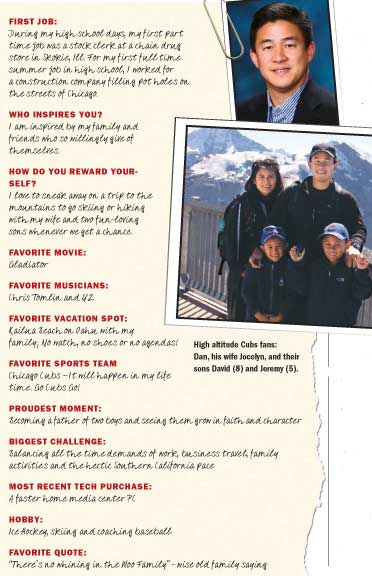Catching Up With Dan Woo, Director of B2B e-Business, Nestle USA
Executive Editor Kara Romanow catches up with Dan Woo, director -- B2B e-Business, Nestle USA, to get his take on challenges and trends in the areas of product innovation, retail and manufacturer collaboration and business-to-business (B2B) e-commerce.
 | What keeps you up at night? WOO: I believe the biggest challenge facing consumer goods manufacturers today is determining how to engage consumers and customers to deliver superior products and solutions. Achieving these objectives includes considering the evolving trends, constantly changing business environments and increasing economic cost pressures. It becomes extremely important to be able to deliver the strong execution needed in today's world while continuing to keep a constant flow of product and process innovation in order to stay ahead of the competition and ever-changing business environment. Incremental process improvements are a given, but they will not be enough. The highly successful companies will figure out ways to change the rules of the game, leverage data in new ways to sell more and do it more effectively. As our Chairman and CEO Brad Alford says, "Deliver the new products and solutions our consumers and customers need before they even know they need them." How can manufacturers and retailers better collaborate? WOO: I believe that collaboration must take into account the end goal: To better serve the needs of the consumer while creating efficiencies and savings that take costs out of the total supply chain. Creating efficiencies for one trading partner that increases the costs of the other trading partner does not accomplish this goal. While I have seen much progress over my more than 17 years in the industry, opportunities still exist. |
I see the more progressive manufacturers and retailers taking initiative to provide their respective data to collectively look for ways to share more, provide insights from both sides of the table and mine the data for improvement opportunities. The key is to figure out ways to measure performance beyond customer distribution center delivery all the way to the shelf, thus increasing total supply chain visibility while sharing the cost of getting there.
What best practices have you observed in the area of e-commerce?
WOO: I believe B2B innovation and automation must be pragmatic and solve real business needs. In an environment of innovation, there will always be some risk. But to increase the odds of success, there must be a clear incentive path for both retailers and manufacturers to reach critical mass. Also, standards must be considered and agreed upon by manufacturers and retailers early in the process. A one-off solution ends up adding to the complexity and typically will struggle to survive long term. I see examples, like EDI, where standards are in place and, for the most part, they work. Today, EDI usage in our industry is at critical mass and solving real business needs for both parties. Global data synchronization is gaining traction because it addresses fundamental business issues of data alignment and accuracy while taking a standard approach.
WOO: I believe B2B innovation and automation must be pragmatic and solve real business needs. In an environment of innovation, there will always be some risk. But to increase the odds of success, there must be a clear incentive path for both retailers and manufacturers to reach critical mass. Also, standards must be considered and agreed upon by manufacturers and retailers early in the process. A one-off solution ends up adding to the complexity and typically will struggle to survive long term. I see examples, like EDI, where standards are in place and, for the most part, they work. Today, EDI usage in our industry is at critical mass and solving real business needs for both parties. Global data synchronization is gaining traction because it addresses fundamental business issues of data alignment and accuracy while taking a standard approach.
It will be interesting to watch the path of progress for RFID/EPC. While I believe there are many potential benefits from small scale usage today, the math problem is a significant obstacle for many companies as they evaluate how to scale EPC considering the cost of the tags, infrastructure and the impact to operations. I believe RFID can gain traction in today's environment within specific areas such as closedloop systems within a factory environment, asset monitoring and potentially in the B2B world for certain product categories with high product costs or special traceability needs. This is another fun part of my job; I get to figure these kinds of things out without reference books and help to shape the future direction of the B2B world
What are the advantages of working in a global company?
WOO: Working for a global company has tremendous advantages. It is extremely helpful to share best practices and innovations on a regular basis with the many experts across the geographies and businesses. This ability to leverage the combined power of a global knowledge base and the many other global assets all with a common goal is a very important success factor. Having common best practices, processes, systems and collaboration tools is foundational to unleashing this capability. Also, just the opportunity to work with many people from different countries and learning about their cultures is fascinating and enjoyable. It really adds to the fun factor. CG
WOO: Working for a global company has tremendous advantages. It is extremely helpful to share best practices and innovations on a regular basis with the many experts across the geographies and businesses. This ability to leverage the combined power of a global knowledge base and the many other global assets all with a common goal is a very important success factor. Having common best practices, processes, systems and collaboration tools is foundational to unleashing this capability. Also, just the opportunity to work with many people from different countries and learning about their cultures is fascinating and enjoyable. It really adds to the fun factor. CG
